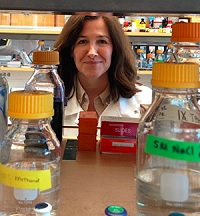 |
| Angie Gelli, principal investigator of the study--Courtesy of UC Davis |
Scientists at the University of California, Davis, have successfully isolated the protein that allows a meningitis-causing fungus to cross the blood-brain barrier, a breakthrough that could lead to new treatments for the condition and other brain infections.
Relatively few organisms are able to breach the blood-brain barrier. The fungus studied by the researchers, which causes cryptococcal meningitis--usually fatal, affecting about 1 million people worldwide--releases spores that pass the blood-brain barrier and are usually passed via the fungus itself, Cryptococcus neoformans, or by bird droppings.
"This study fills a significant gap in our understanding of how C. neoformans crosses the blood-brain barrier and causes meningitis," said Angie Gelli, an associate professor of pharmacology at UC Davis and principal investigator of the study, in a statement.
The discovery was published in the journal mBio on June 3. To illustrate how C. neoformans breaches the blood-brain barrier, researchers first isolated the unique protein that allows for it: Mpr1. They then bound it to a strain of common baking yeast, which can neither pass the blood-brain barrier nor express the unique protein. When the scientists injected mice with the yeast expressing Mpr1, they died, while mice given spores modified not to carry Mpr1 stayed alive, confirming that the protein is responsible for the barrier-breaching mechanism.
Gelli said that the study holds major implications for drug delivery, as Mpr1 could be developed as part of a vehicle to deliver treatments for brain infections and cancers. Also, either Mpr1 or reproducing its mechanism of action could greatly increase survival in someone infected by C. neoformans.
"The biggest obstacle to treating many brain cancers and infections is getting good drugs through the blood-brain barrier," Gelli said. "If we could design an effective delivery system into the brain, the impact would be enormous for treating some of these terrible diseases."
- here's the release from UC Davis
- and here's the study in mBio
Releated Articles:
Mayo Clinic team successfully delivers small molecules to the brain past blood-brain barrier
UC Davis team isolates fungus enzyme to cross blood-brain barrier